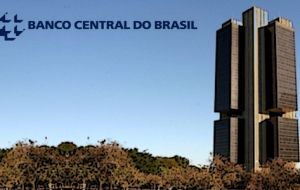MercoPress. South Atlantic News Agency
Brazil's central bank puts off signals about next year's interest rate policy
 The bank repeated meeting recommendations of a moderate reduction in the pace of easing going forward, leading analysts to predict a 50-point cut in December
The bank repeated meeting recommendations of a moderate reduction in the pace of easing going forward, leading analysts to predict a 50-point cut in December Brazil’s central bank has decided to put off any signals about its 2018 interest rate decisions, the bank said on Tuesday, leaving the door open for lower rates next year as the economy recovers with inflation under control.
In the minutes of the central bank’s Oct. 25 monetary policy meeting, in which it reduced the benchmark interest rate to 7.50 percent, policymakers said they wanted to maintain leeway for action as they monitor inflation expectations and the incipient recovery from a deep recession.
The bank reiterated that a moderate reduction in the pace of easing seems appropriate at its Dec. 6 meeting, signaling it remains likely to cut the Selic rate by 50 basis points, to a record-low 7%, after reducing it by 75 basis points last week.
Most economists have been expecting a December rate cut to be the last in the current easing cycle that has nearly halved rates from a decade-high of 14.25% in just one year. Some though had interpreted last week’s decision as a signal the bank was preparing to cut rates as low as 6.50% in 2018.
The Brazilian economy has resumed growth after two years of deep recession in 2015 and 2016 that shed nearly 3 million jobs and left huge idle industrial capacity. Inflation has plunged from double-digits to less than 3%, far below the official target of 4.5%, and is forecast by the central bank to stay around the goal through the end of 2019.
The following observations provide an update of the Copom's baseline scenario:
The set of indicators of economic activity released since the last Copom meeting is consistent with a gradual recovery of the Brazilian economy;
The global outlook has been favorable, as global economic activity remains on a gradual recovery path, without exerting excessive pressure on financial conditions in advanced economies. This supports risk appetite towards emerging economies;
The Committee judges that its baseline inflation scenario has evolved as expected. Inflation developments remain favorable, with various measures of underlying inflation running at comfortable levels. This includes the components that are most sensitive to the business cycle and monetary policy;
Inflation expectations collected by the Focus survey retreated to around 3.1% for 2017 and 4.0% for 2018. Expectations for 2019 and 2020 are around 4.25% and 4.0%, respectively.
The Copom's inflation projections in the scenario with interest rate and exchange rate paths extracted from the Focus survey stand around 3.3% for 2017, 4.3% for 2018, and 4.2% for 2019. This scenario assumes a path for the policy interest rate that ends 2017 and 2018 at 7.0%, and increases to 8.0% during the course of 2019.
The Committee emphasizes that its baseline scenario involves risks in both directions. On the one hand, the combination of (i) possible second-round effects of the favorable food price shock and of low current levels of industrial goods inflation, and (ii) the possible propagation through inertial mechanisms of low inflation levels may lead to a lower-than-expected prospective inflation trajectory. On the other hand, (iii) frustration of expectations regarding the continuation of reforms and necessary adjustments in the Brazilian economy may affect risk premia and increase the path for inflation over the relevant horizon for the conduct of monetary policy. This risk intensifies in the case of (iv) a reversal of the current benign global outlook for emerging economies.
Taking into account the baseline scenario, the balance of risks, and the wide array of available information, the Copom unanimously decided to reduce the Selic rate by 0.75 percentage point, to 7.50 percent per year, without bias. The Committee judges that convergence of inflation to the 4.5% target over the relevant horizon for the conduct of monetary policy, which includes 2018 and 2019, is compatible with the monetary easing process.
The Committee judges that economic conditions prescribe accommodative monetary policy, i.e., interest rates below the structural level.
The Copom emphasizes that the evolution of reforms and necessary adjustments in the Brazilian economy contributes to the reduction of its structural interest rate. The Committee will continue to reassess estimates of this rate over time.
The evolution of the baseline scenario, in line with expectations, and the stage of the monetary easing cycle made it appropriate to reduce the Selic rate by 0.75 percentage point at this Copom meeting. Regarding the next meeting, provided the Committee's baseline scenario evolves as expected, and taking into account the stage of the monetary easing cycle, at this time the Copom views a moderate reduction of the pace of easing as appropriate. The Copom emphasizes that the monetary easing process will continue to depend on the evolution of economic activity, the balance of risks, possible reassessments of the extension of the cycle, and on inflation forecasts and expectations.
The following members of the Committee voted for this decision: Ilan Goldfajn (Governor), Carlos Viana de Carvalho, Isaac Sidney Menezes Ferreira, Maurício Costa de Moura, Otávio Ribeiro Damaso, Paulo Sergio Neves de Souza, Reinaldo Le Grazie, Sidnei Corrêa Marques e Tiago Couto Berriel.




Top Comments
Disclaimer & comment rules-

Read all commentsRJ TODAY:
Nov 04th, 2017 - 08:38 am 0https://i2.wp.com/www.humorpolitico.com.br/wp-content/uploads/2017/11/ministro-da-justica-no-rio-policia-e-deputados-sao-socios-do-crime.jpg?w=650&ssl=1
BRAZIL - TOMORROW!
Commenting for this story is now closed.
If you have a Facebook account, become a fan and comment on our Facebook Page!